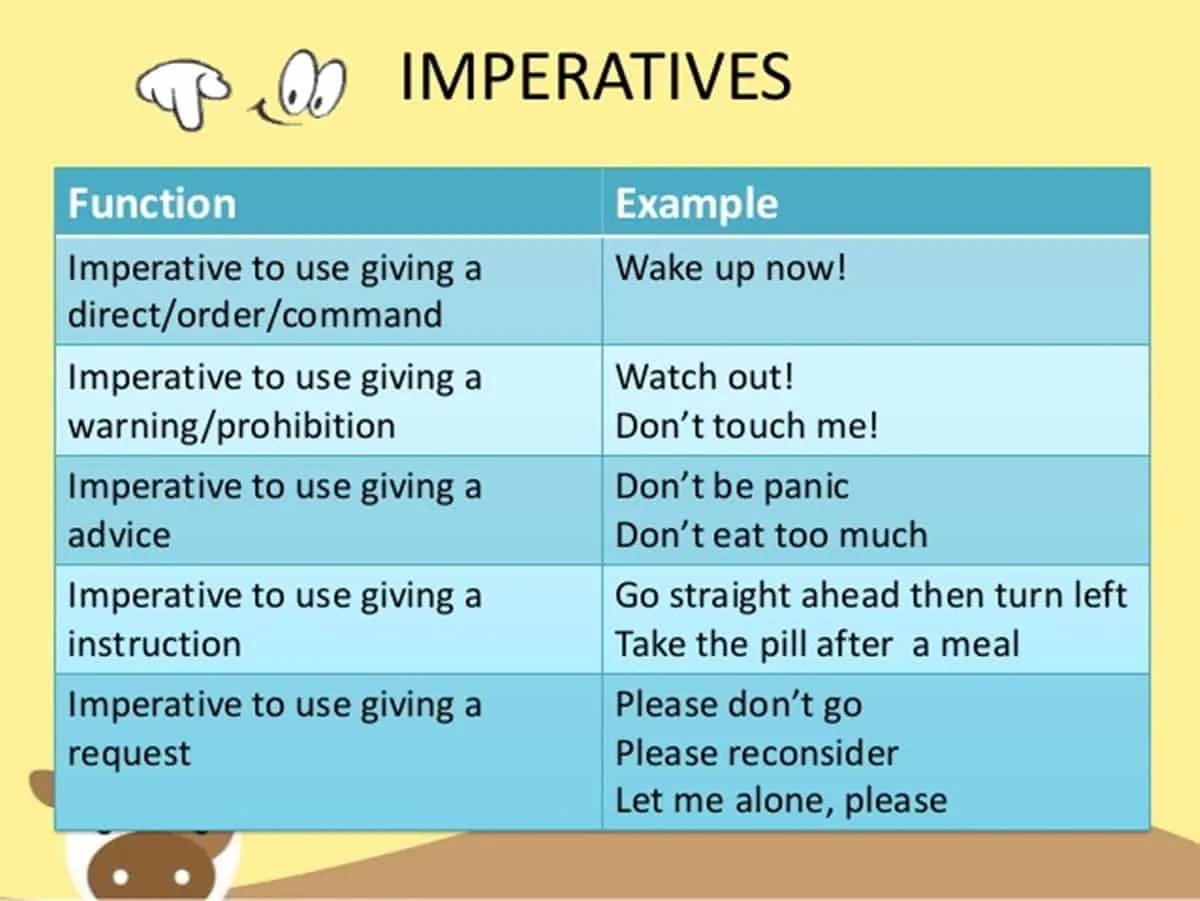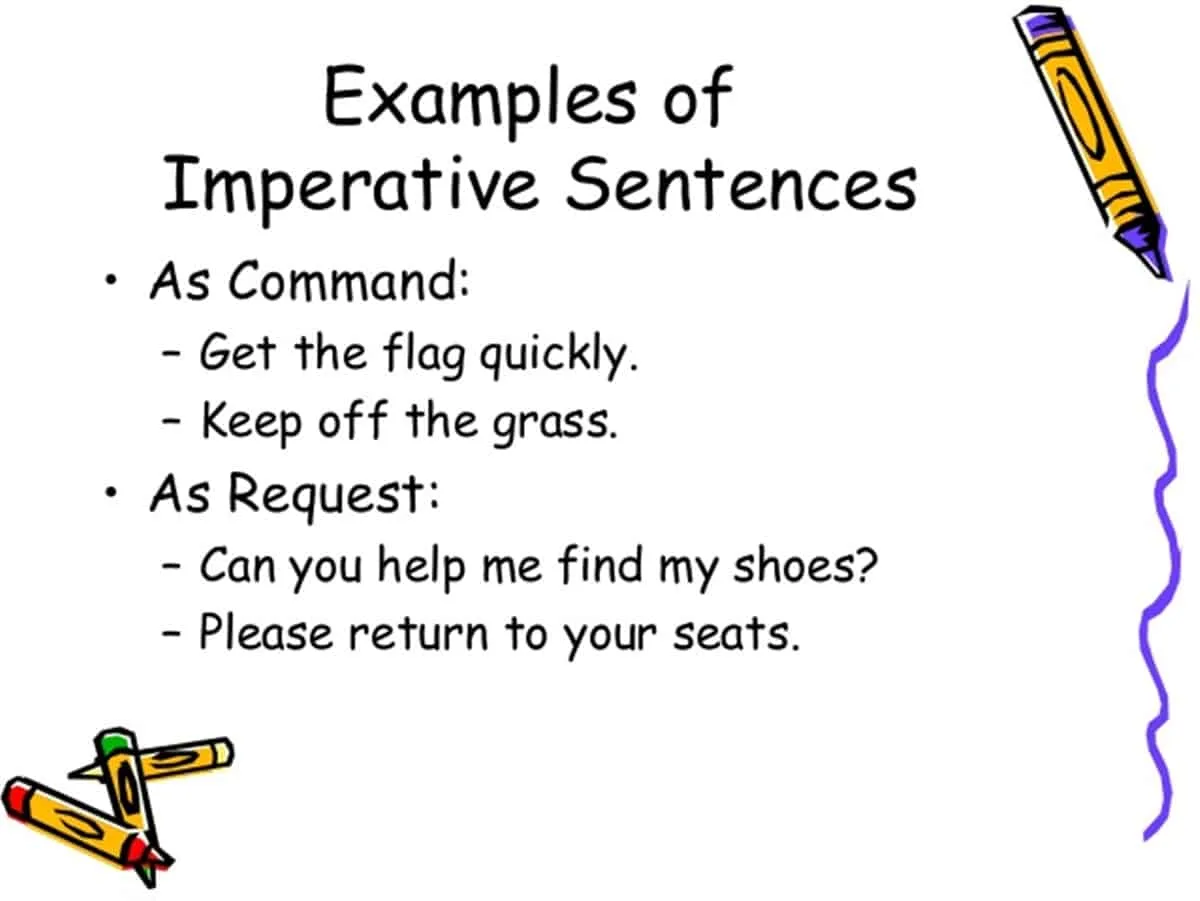We use imperative sentences when we want to tell someone to do something (most commonly for advice, suggestions, requests, commands, orders or instructions).
We can use them to tell people to do or not to do things. They usually don’t have a subject – they are addressed to the listener or listeners, who the speaker understands to be the subject. We use the base form of the verb.
Imperative Sentences
What are Imperative Sentences?
Imperative sentences are sentences that give commands or make requests. They usually take the form of a verb followed by the subject “you”. They often appear as instructions or commands and tend to sound direct and forceful. Examples include “Close the door.” or “Bring me a glass of water.”
Form of Imperative Sentences
The form of Imperative Sentences is usually a verb followed by the subject “you”. For example, “Close the door.” or “Bring me a glass of water.”.
In some cases, the subject may not be explicitly stated and is understood to be “you”. For example, “Open the window.” is equivalent to “You open the window.”.
It is important to note that the tone of imperative sentences is direct and forceful, and they are used to give commands or make requests.
Examples of Imperative Sentences
Learn how to use Imperative Sentences in English with examples.
An imperative clause usually ends with a period (.), but it may also end with an exclamation point (!).
For examples:
- Get out of my way!
- Stop talking and open your book.
- Go upstairs.
- Brush your teeth.
- Read the instructions.
- Switch off your mobiles.
- Hurry!
- Wait!
- Don’t be late!


Types of Imperative Sentences
Directives can take one of several forms in everyday speech and writing. A few of the most common uses include:
- A request: Please consider.
- An invitation: Come to my party.
- A command/direct/order: Wake up now!
- An instruction: Go straight ahead and turn left.
- An advice: Don’t eat too much.
- A warning/prohibition: Don’t touch me!



Modifying an Imperative Sentence
At their most basic, imperative sentences are binary, which is to say they must be either positive or negative.
Positive imperatives use affirmative verbs in addressing the subject; negatives do the opposite.
For examples:
- Get up early – Don’t get up early.
- Park your car here – Don’t park your car here.
- Post those letters – Don’t post those letters.





We can use “do” or “just” to the beginning of the sentence, or the word “please” to the conclusion – called softening the imperative—makes imperative sentences more polite or conversational.

Imperatives with “Do”
When we use the emphatic “Do” auxiliary, it makes an imperative sound more polite and more formal.
- Do sit down.
- Do be quiet.
- Do your best.
- Do not forget to call your mother.
- Do come back soon.
- Do your homework.

Imperatives with “Let” (Let’s)
Imperatives with “Let” (also known as “Let’s”) refer to commands or requests that use the verb “let” in their formation. For example, “Let’s go for a walk.” or “Let me show you how to do it.”.
We use “Let” to form first-person and third-person imperatives.
- Let me see. What should I do?
- Let’s go.
In more formal contexts, we use the full form “Let us“.
- Let us go.


In conclusion, Imperative Sentences are an important part of daily communication and play a crucial role in giving instructions, making requests, and giving advice or suggestions. They are usually formed by a verb followed by the subject “you” and convey a direct and forceful tone.
Understanding the form and use of Imperative Sentences is important for effective communication and can help individuals express their thoughts and ideas clearly and effectively. Whether in written or spoken language, Imperative Sentences are a common feature in many different contexts and situations.
Overall, it is valuable to have a solid understanding
- Plural of Roof: A Simple Guide to Basic English Grammar - October 3, 2023
- Black Baby Names: Popular & Unique Names for Your Little One for Fun Naming - October 2, 2023
- List of Homonyms to Avoid Confusion in Your Writing - September 30, 2023

Jonizar
Wednesday 21st of December 2022
Thanks a lot. So various and interesting for me myself and my beloved students. Keep on sharing
BTS Army Fan
Wednesday 10th of March 2021
No
ensi
Tuesday 2nd of February 2021
great. Simple explanation. I can understand it well. thank you..
Carlos
Saturday 14th of October 2017
Great!